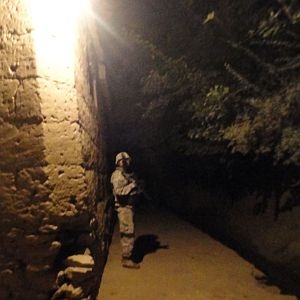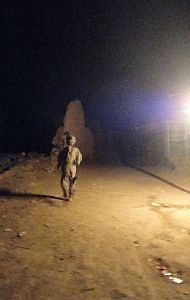 Visit The Series Page:
Visit The Series Page:
Report From Afghanistan
(Host) We’re spending time with the Vermont National Guard during part of their yearlong deployment.
Among the jobs the jobs the Vermont Guard is responsible for is training the country’s police force.
The Afghan National Police are the weakest part of the country’s security forces. And strengthening them is important to any U.S. plans to withdraw from the country.
VPR’s Steve Zind is with the Guard and he recently joined them for a late night patrol in one provincial capital.
(Michael Cram) "Welcome to the briefing tonight. Tonight’s mission statement is a combined dismounted in the vicinity of Charikar."
(Zind) It’s just after midnight when Sergeant Michael Cram of Milton briefs the soldiers prior to their three hour patrol in and around Charikar.
(Cram) "It’s going be high 86, we’ve already passed that, low of 64. If you guys haven’t already noticed the weather’s starting to take a dive to Vermont temperatures."
(Zind) The body armor they wear whenever the soldiers leave base is augmented tonight by night vision equipment. Glow sticks front and back on the helmet or the vest will help identify the soldiers to each other as friendly troops. .
(Cram) "Once we’re in the slummy areas of the city with the tall walls its going to be pitch black so IR strobes and lights."
(Zind) Charikar is the capital of Parwan province. It’s a city of about 30 thousand surrounded by many villages. Lieutenant Justin Kokernak of Northfield says it’s a lot more peaceful here than it was further south in Afghanistan where the group was stationed previously.
(Kokernak) "Charikar is a quiet area, Parwan is in general. Still there’s stuff that goes on here, criminal activity and intimidation, things we like to disrupt and catch if we can. There’s been a few IED instances here, some RPG attacks at night."
(Zind) It’s unlikely we’ll see any improvised explosive devices or rocket propelled grenades tonight. But as they begin to move out of the police station these members of a Vermont Guard MP unit based in Northfield move slowly and take every precaution they’d take in a more dangerous area. There’s another important purpose, though. They’re patrolling with the Afghan National Police – or ANP. They do it every day in their role as police mentors.
(Kokernak) "Well first it gives them confidence. You’ll see it. They’re pretty happy to see us when they come by one of their checkpoints. We help them out, we’ve brought them expertise. We have a lot of experienced police officers here like Sergeant Cram. He’s been a cop for longer than I’ve been alive I think. We’ve got a lot to teach them, to share with them."

(Zind) Kokernak says the Afghan police in this area still have a long way to go. There are still many who lack any police academy training and the officers lack administrative skills. We walk slowly down Charikar’s main street. Kokernak notices a man in the shadows across the street who holds something that looks like a weapon. We cross to him.
(Watchman) "Salam."
(Kokernak) "He’s the watchman."
(Zind) The man is the Charikar bazaar watchman. Kokernak asks he’s seen anything unusual or has any concerns and we move on.
(Zind) You thought he might have a weapon. Is it unusual for people to carry weapons around here?"
(Kokernak) No, not at all. You’ve got a lot of private security guards. Everyone with money has their own little contingent with weapons, so it’s not unusual at all."
(Zind) "Walking through some agriculture area right now. Kind of muddy and wet."
(Kokernak) "It’s surprising you encounter a lot of people outside at night. Especially farmers who’ll be sleeping in their field, just to keep an eye on their water, their crops. Water can be a big issue around here."
(Zind) "Do you have a sense of how long it would be necessary to do this?"
(Kokernak) "I’d say comparatively, the police here in Parwan are a little farther along than what we’ve seen in Ghazni. It just depends on the area of the country and how remote it is. I think the police training is definitely coming along, you see the newer recruits coming out of the academy are a lot more proficient than some of the older guys who just picked up the job and never got trained."
(Zind) "Still, do you think it would be a good idea to continue these joint patrol for years?"
(Kokernak) "We do have a goal of eventually completely handing this over to the Afghans. You see every day they’re given a little bit more responsibility. For example, these upcoming elections where they’re basically running the show entirely. "
(Zind) "Now this is some serious water we’re going to have to basically step in to cross, with a helping hand. Going to have to step in it right?"
(Zind) A little further down the road, we reach the first Afghan National Police checkpoint. The Afghan officer there is a little over the top in the way he acknowledges our presence.
(Officer yells loudly.)
(Cram) "Salam…anything significant happen tonight?"
(Policeman – through translator) "He says everything is alright."
(Cram) "Four or five days ago there was an illegal checkpoint about 4 kilometers east of here. Does he know anything about it?"
(Translator) "No he doesn’t know anything about it."

(Zind) I ask the Afghan policeman how he’s helped by the Americans. He mentions training and equipment. Then I ask whether it would make any difference if the Americans left Afghanistan. The translator gives his reply:
(Translator) "He says for now we really need them here, but when we work together and kick the enemies out of Afghanistan by that time they will be alright."
(Zind) After we’re on our way, I ask Lieutenant Kokernak about the illegal checkpoint the soldier said he was unaware of.
(Zind) "When that policeman said he didn’t know about that illegal checkpoint, do you take him at his word?"
(Kokernak) "A lot of times they just don’t want to lose face. So if you’re just talking with them for the first time, they’re not going to give you the full story. You have to build a relationship, build trust and then they’ll start opening up and saying, ‘OK, we have these problems. We’re deficient here. The bad guys are here. We need help here.’ It’s just part of the culture."
(Zind) Kokernak echoes something that other members of the Vermont Guard who are here training the Afghan Police say. They say their approach can work – but it’s not an approach that will lead to the departure of U.S. troops anytime soon.
For VPR News, I’m Steve Zind in Charikar, Afghanistan.